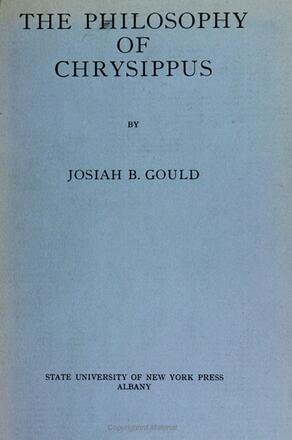
The Philosophy of Chrysippus
Alternative formats available from:
Description
The Philosophy of Chrysippus is a reconstruction of the philosophy of an eminent Stoic philosopher, based upon the fragmentary remains of his voluminous writings. Chrysippus of Cilicia, who lived in a period that covers roughly the last three-quarters of the third century B. C., studied philosophy in Athens and upon Cleanthes' death became the third head of the Stoa, one of the four great schools of philosophy of the Hellenistic period. Chrysippus wrote a number of treatises in each of the major departments of philosophy, logic, physics, and ethics. Much of his fame derived from his acuteness as a logician, but his importance for Stoic philosophy generally was acknowledged in antiquity in the saying, "Had there been no Chrysippus, there would be no Stoa. "
Previous accounts of Chrysippus' philosophy, including Émile Bréhier's study, the only work in this century which had sought to deal with Chrysippus' philosophy alone, blurred the distinctive contributions of Chrysippus to Stoic philosophy and failed to bring to light the peculiar features in his thought. The vagueness in these accounts resulted in large measure from the assumption that if an ancient author ascribed a doctrine to "the Stoics" or "Stoicism", one could infer that the doctrine belonged to Chrysippus.
Professor Gould works from the more circumspect methodological principle that unless an ancient author explicitly ascribes a doctrine to Chrysippus, his testimony cannot be used in reconstructing Chrysippus' philosophy. Working with those of the fragments in Hans von Arnim's collection, Stoicorum Veterum Fragmenta, which are explicitly Chrysippean in the sense suggested, Mr. Gould has worked out an account of Chrysippus' views in the fields of logic, natural philosophy, and ethics. In order that Chrysippus' thought might be viewed in context Mr. Gould provides a background picture by describing the third century milieu in which the Stoic philosopher worked. This follows an account of Chrysippus' life and reputation in antiquity and a description of modern assessments of Chrysippus' position in the Stoa.
In his account of Chrysippus' philosophy Mr. Gould frequently introduces comparisons and contrasts with Plato and Aristotle to help emphasize the continuity between Hellenic and early Hellenistic philosophy.
Finally, in a concluding chapter, the author shows that the dominant themes in Chrysippus' philosophy, while not exhibiting a thoroughly well-knit system, nevertheless are woven together into a remarkably comprehensive whole, which must have been extraordinarily impressive in antiquity.